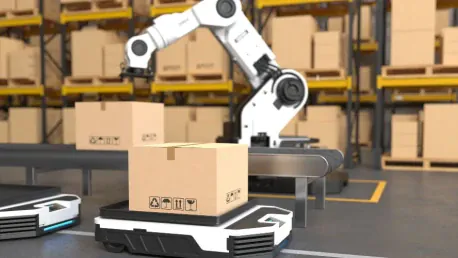In today’s fast-paced business environment, logistics companies are turning to artificial intelligence (AI) to optimize their inventory management processes. By leveraging AI-powered inventory management systems, companies can significantly improve efficiency, reduce costs, and enhance customer satisfaction. AI is increasingly being integrated into various sectors, and the logistics industry is no exception. This technological advancement has the potential to revolutionize how inventory is managed, ultimately transforming supply chains to be more responsive and efficient. As businesses face growing demands and complexities, AI offers a solution that can handle large-scale data analysis and provide actionable insights.
The traditional methods of inventory management often involve significant manual effort and are prone to errors. AI, on the other hand, employs sophisticated algorithms and machine learning techniques to analyze historical data, market trends, and external factors in real time. This capability allows companies to predict future demand accurately, maintain optimal stock levels, and avoid both overstocking and stockouts. Moreover, AI-powered systems provide real-time visibility into inventory levels across multiple locations, enabling better decision-making and resource allocation. This kind of visibility is crucial for companies aiming to streamline operations and respond swiftly to market changes.
The Power of AI in Inventory Management
Artificial intelligence is reshaping the landscape of inventory management in logistics. One of the most impactful uses of AI in this arena is demand forecasting. AI algorithms can process vast amounts of data, including past sales figures, market trends, and external variables such as weather conditions, to predict future demand with remarkable accuracy. Accurate demand forecasting allows companies to maintain optimal stock levels, thereby reducing the risks associated with both overstocking and stockouts. This predictive capability ensures that businesses are better prepared to meet customer demands without incurring unnecessary costs.
Real-time inventory tracking is another significant advantage of AI in inventory management. Traditional systems often rely on periodic stock counts, which can lead to discrepancies and delays in identifying inventory shortages or surpluses. AI-powered systems, however, provide continuous visibility into inventory levels across multiple warehouses and distribution centers. This real-time tracking capability enables managers to make informed decisions quickly and adjust inventory levels as needed. Additionally, automated reordering systems can generate purchase orders when stock levels reach predetermined thresholds, ensuring a steady supply of products and minimizing the risk of stockouts.
Key Benefits of AI in Inventory Management
Implementing AI in inventory management offers numerous advantages, starting with cost reduction. By optimizing stock levels and reducing waste, companies can significantly cut inventory holding costs. The accuracy provided by AI systems also minimizes human error in inventory counting and forecasting, ensuring that businesses can maintain more precise stock levels and avoid costly mistakes. Furthermore, AI-driven systems enhance customer satisfaction by reducing instances of stockouts and enabling faster delivery times. With better-managed inventories, customers are more likely to find the products they need when they need them, resulting in a more positive shopping experience.
Data-driven decision-making is another key benefit of AI in inventory management. Advanced analytics capabilities allow managers to gain valuable insights from their data, enabling them to make more informed and strategic decisions. For example, AI can identify patterns and trends that may not be immediately apparent to human analysts, providing a deeper understanding of market dynamics and helping businesses stay ahead of the competition. Additionally, AI systems are highly scalable, meaning they can easily handle increased inventory volumes as businesses grow. This scalability ensures that companies can continue to operate efficiently and effectively, even as their inventory management needs become more complex.
Implementing AI in Your Inventory Management System
To successfully integrate AI into your inventory management system, it is essential first to assess your current inventory processes and identify areas for improvement. Understanding where inefficiencies and bottlenecks exist will help you determine the most appropriate AI solutions for your business. Once these areas are identified, the next step is to choose an AI solution that aligns with your specific needs and goals. Consider factors such as the size of your inventory, the complexity of your supply chain, and the level of integration required with your existing systems. Selecting the right AI tool is crucial for ensuring a smooth implementation process and maximizing the benefits of AI.
Quality data is critical for training AI models effectively. Ensure that your data is accurate, complete, and up-to-date before implementing AI. Investing in employee training is also vital to maximize the benefits of your new AI-powered system. Training your staff on how to use AI tools and interpret the generated insights will empower them to make better decisions and improve overall efficiency. Additionally, continuously monitoring and refining your AI models is essential for maintaining optimal performance. Regular updates and adjustments based on new data and evolving business needs will help ensure that your AI-driven inventory management system continues to deliver value over time.
The Future of AI in Inventory Management
In the modern business world, logistics companies are increasingly adopting artificial intelligence (AI) to streamline their inventory management. By using AI-driven inventory systems, businesses can boost efficiency, cut costs, and improve customer satisfaction. This technology is making waves across various industries, and logistics is no different. AI stands to fundamentally change how inventory is managed, making supply chains more adaptable and efficient. With the growing complexity and demands in business, AI provides a way to handle massive data analysis and generate useful insights.
Traditional inventory management relies heavily on manual processes and is often error-prone. Conversely, AI utilizes advanced algorithms and machine learning to examine historical data, market trends, and external conditions in real time. This lets companies accurately forecast future demand, maintain optimal stock levels, and prevent both overstocking and shortages. Additionally, AI-powered systems offer real-time inventory visibility across multiple sites, facilitating better decision-making and resource allocation. Such visibility is crucial for businesses looking to enhance operations and quickly adapt to market shifts.









